九上 unit 1 第一课时学案
九年级Unit1一课时学案
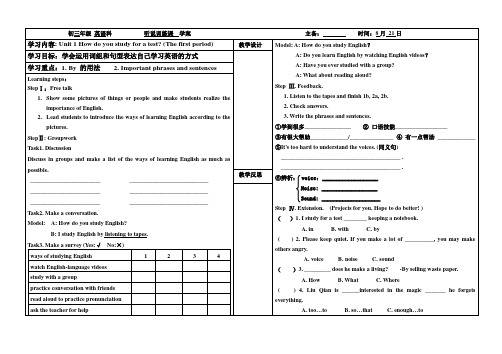
⑥辨析:voice:___________________
Noise: ___________________
Sound: ____________________
StepⅣ. Extension. (Projects for you. Hope to do better! )
初三年级英语科听说训练课学案主备:时间:8月21日
学习内容:Unit 1 How do you study for a test? (The first period)
教学设计
Model: A: How do you study English?
A: Do you learn English by watching English videos?
2.Lead students to introduce the ways of learning English according to the pictures.
Stepscuss in groups and make a list of the ways of learning English as much as possible.
1
2
3
4
watch English-language videos
study with a group
practice conversation with friends
read aloud to practice pronunciation
ask the teacher for help
教学反思
________________________ ___________________________
人教版九年级英语全一册Unit1第1课时教案

a. Yes, I have. I’ve learned a lot that way.
b. Oh, yes. It really improves my speaking skills.
B: I study by…
Step 6 Listening
2a,Listen and check the questions you hear.
1 ____ Does anyone learn English by watching videos?
2 ____ Do you have conversations with friends in English?
S: I study English by ______.
by working with friends.
by making word cards.
by asking the teacher for help.
by reading the textbook.
by working with a group.
Let the students read the conversation in pairs first and then discuss the difficult points
If necessary, the teacher can help the students
Then give the students a few minutes to practice the dialogue.
2. His grandfather made a living _________ (靠卖水果) in the past.
新目标九年级上册unit1学案
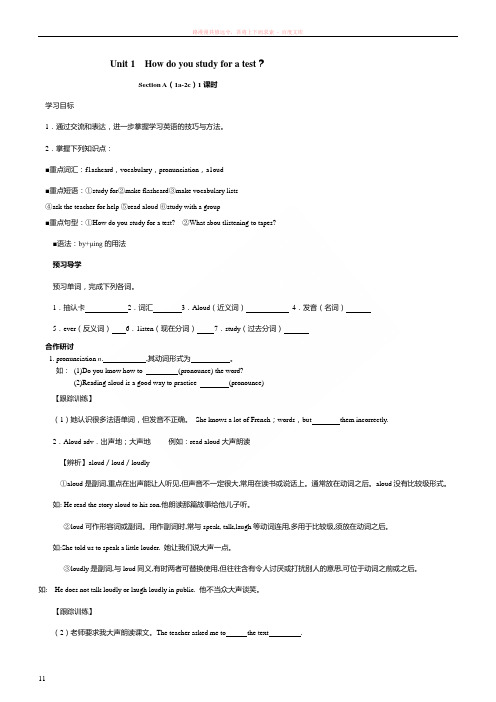
Unit 1 How do you study for a test?Section A(1a-2c)1课时学习目标1.通过交流和表达,进一步掌握学习英语的技巧与方法。
2.掌握下列知识点:■重点词汇:f1ashcard,vocabulary,pronunciation,a1oud■重点短语:①study for②make flashcard③make vocabulary lists④ask the teacher for help ⑤read aloud ⑥study with a group■重点句型:①How do you study for a test? ②What abou tlistening to tapes?■语法:by+μing的用法预习导学预习单词,完成下列各词。
1.抽认卡2.词汇3.Aloud(近义词)4.发音(名词)5.ever(反义词)6.1isten(现在分词)7.study(过去分词)合作研讨1. pronunciation n.____________,其动词形式为。
如:(1)Do you know how to (pronounce) the word?(2)Reading aloud is a good way to practice (pronounce)【跟踪训练】(1)她认识很多法语单词,但发音不正确。
She knows a lot of French;words,but them incorrectly.2.Aloud adv.出声地;大声地例如:read aloud大声朗读【辨析】aloud/loud/loudly①aloud是副词,重点在出声能让人听见,但声音不一定很大,常用在读书或说话上。
通常放在动词之后。
aloud没有比较级形式。
如: He read the story aloud to his son.他朗读那篇故事给他儿子听。
②loud可作形容词或副词。
人教版九年级英语上册教案 Unit1 第1课时教案
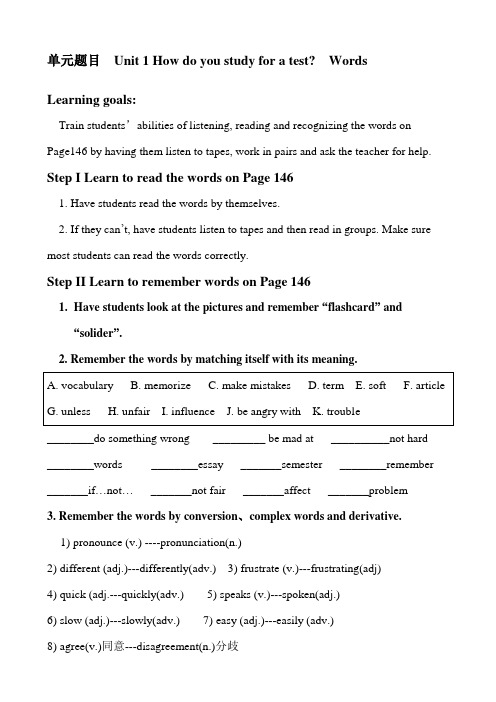
单元题目Unit 1 How do you study for a test? WordsLearning goals:Train students’abilities of listening, reading and recognizing the words on Page146 by having them listen to tapes, work in pairs and ask the teacher for help. Step I Learn to read the words on Page 1461. Have students read the words by themselves.2. If they can’t, have students listen to tapes and then read in groups. Make sure most students can read the words correctly.Step II Learn to remember words on Page 1461.Have students look at the pictures and remember “flashcard” and“solider”.2. Remember the words by matching itself with its meaning.________do something wrong _________ be mad at __________not hard ________words ________essay _______semester ________remember _______if…not…_______not fair _______affect _______problem3. Remember the words by conversion、complex words and derivative.1) pronounce (v.) ----pronunciation(n.)2) different (adj.)---differently(adv.) 3) frustrate (v.)---frustrating(adj)4) quick (adj.---quickly(adv.) 5) speaks (v.)---spoken(adj.)6) slow (adj.)---slowly(adv.) 7) easy (adj.)---easily (adv.)8) agree(v.)同意---disagreement(n.)分歧9) important (adj)重要的---unimportant(adj)不重要的10). Friend n.)朋友---friendship(n.)友情11) fair (adj.公平的---unfair(adj.)不公平的Step III Consolidation of words1.Have students check if they remember all the words by working in pairsand check each other.2.If they can’t, they can open the books and read them again. Then dictatethem in the exercise by themselves.Step IV Read and translate the storyEnglish is widely used in the world. Many people regard English learning as an important part of their development. I try my best to find good solutions to deal with the problem. Now I have some specific suggestions.First, we must have active attitude. We shouldn’t be afraid to make mistakes and be laughed at. We should face the challenges just like a soldier.Then, we must have some good ways of learning English. Here are some ways.To be a good language learner, we must get our pronunciation right. Listening to tapes and watching videos can help us a lot. Maybe at first we can’t understand the speakers because they speak too quickly. But it doesn’t matter. Go on with it and try to follow them. Later on, you can pronounce the words well. Another secret is that we can read aloud to practice spoken English.V ocabulary is another challenge. My teacher offers me some help. She tells me that memorizing new words is not so frustrating as I think. She adds that making vocabulary lists and flashcards may impress me very much and reading textbooks isalso a great idea.Grammar is language rules. It’s very important. First of all, we must know the rules well by taking notes. Then, we can make up stories and make complete sentences to practice them.Besides all the good ways, I realize that I won’t succeed unless I word hard. Step V 画思维树,必须画Step VI当堂检测一.按要求写出下列单词。
英语九年级上册Unit 1第一课时导学案
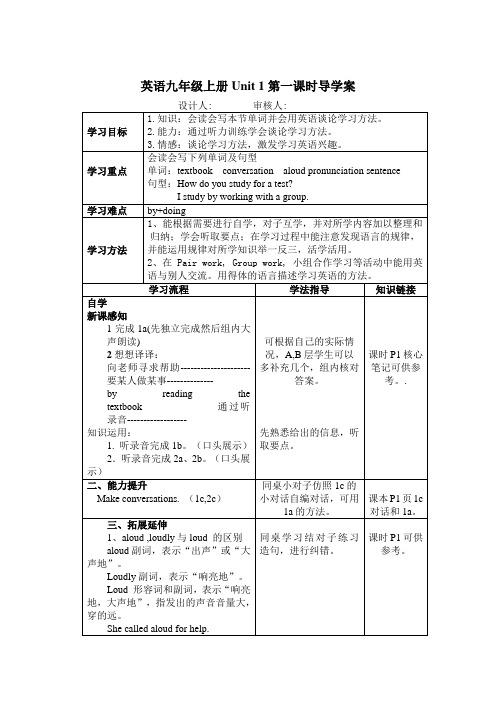
Make conversations.(1c,2c)
同桌小对子仿照1c的小对话自编对话,可用1a的方法。
课本P1页1c对话和1a。
三、拓展延伸
1、aloud ,loudly与loud的区别
aloud副词,表示“出声”或“大声地”。
Loudly副词,表示“响亮地”。
Loud形容词和副词,表示“响亮地,大声地”,指发出的声音音量大,穿的远。
A too to walk B too walking C can’t to walk D very to walk
( ) 4、________ hard for people to swim in winter.
A That’s B This is C It’s D Its
( ) 5、I’ve learned ________ by watching English-language videos.
4 He improves his English by _____(ask) questions.
5 The box is too heavy for him _____(carry).
6 Let’s read aloud______(practice)our____(pronounce).
She called aloud for help.
The music is too loud,please turn it down.
Don‘t talk so loudly.
2、too+adj/adv +to do sth太······而不能······可与so+adj +that从句互换,或not +adj的反义词+enough to do sth互换。
九年级第一单元第一课时导学案

A. play B. playing C. to play D. played
(4)careful you are,mistakes you’ll make
A. The more; the less B. The fewer; the more
C. The less; the less D. The more; the fewer
(5) You can improve your Englishpracticing more.
A. by B. with C. of D. in
3.根据汉语提示用准确形式填空。
(1).你是如何学习来参加考试的?
2.重点短语:
ask…for…; study for a test; have conversations with…; word by word; the more……the more…
3.重点句型:
—Howdo you study for a test?
—I studyby working with a group
(3)What’s the problem?
5.翻译2d对话,找出其中的重难点。
展示:学生上台自由表演对话,及展示书本中听力练习和检测题的答案,并对存有疑问的地方提出质疑
反馈(或检测):
1.翻译下面的短语:
阅读课本备考
听磁带向老师求助
练习发音制作单词卡片
和朋友实行对话(在词典等中)查阅
看英语节目读词组
自学(一)
1.根据音标大声朗读新单词,看谁读得最好!
2.写出下列单词和短语,看谁的速度是最快的!
向…要…备考
小学英语九年级上册人教版教案 Unit 1 第1课时
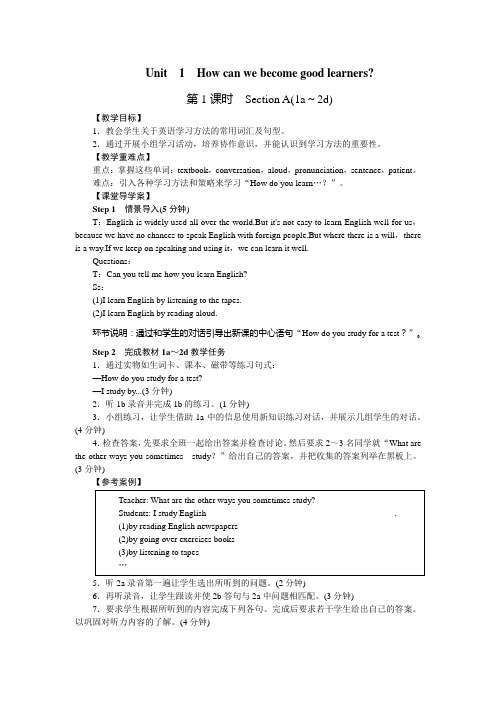
Unit 1How can we become good learners?第1课时Section A(1a~2d)【教学目标】1.教会学生关于英语学习方法的常用词汇及句型。
2.通过开展小组学习活动,培养协作意识,并能认识到学习方法的重要性。
【教学重难点】重点:掌握这些单词:textbook,conversation,aloud,pronunciation,sentence,patient。
难点:引入各种学习方法和策略来学习“How do you learn…?”。
【课堂导学案】Step 1情景导入(5分钟)T:English is widely used all over the world.But it's not easy to learn English well for us,because we have no chances to speak English with foreign people.But where there is a will,there is a way.If we keep on speaking and using it,we can learn it well.Questions:T:Can you tell me how you learn English?Ss:________________________________________________________________________(1)I learn English by listening to the tapes.(2)I learn English by reading aloud.环节说明:通过和学生的对话引导出新课的中心语句“How do you study for a test?”。
Step 2完成教材1a~2d教学任务1.通过实物如生词卡、课本、磁带等练习句式:—How do you study for a test?—I study by...(3分钟)2.听1b录音并完成1b的练习。
九上unit 1 学案
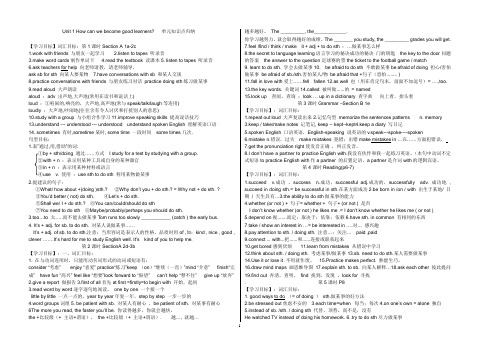
Unit 1 How can we become good learners? 单元知识点归纳【学习目标】词汇目标:第1课时Section A 1a-2c1.work with friends 与朋友一起学习2.listen to tapes 听录音3.make word cards制作单词卡4.read the textbook 读课本5. listen to tapes 听录音6.ask teachers for help 向老师请教,请老师辅导,ask sb for sth 向某人要某物7.have conversations with sb 和某人交谈8.practice conversations with friends 与朋友练习对话practice doing sth练习做某事9.read aloud 大声朗读aloud :adv 出声地,大声地(常用在读书和说话上)loud :①喧闹的,响亮的,大声地,高声地(常与speak/talk/laugh等连用)loudly :大声地,吵闹地(往往含有令人讨厌和打扰别人的意思)10.study with a group 与小组合作学习11.improve speaking skills 提高说话技巧13.understand --- understood --- understood understand spoken English 理解英语口语14. sometimes 有时,sometime某时, some time 一段时间some times几次.句型目标:1.表”通过,用,借助”的词:①by + sth/doing 通过……方式I study for a test by studying with a group.②with + n :表示用某种工具或自身的某种器官③in + n :表示用某种材料或语言④use v. 使用:use sth to do sth 利用某物做某事2.提建议的句子:①What/ how about +(doing )sth.? ②Why don’t you + do sth.? = Why not + do sth. ?③You’d better ( not) do sth. ④Let’s + do sth.⑤Shall we/ I + do sth.? ⑥You can/could/should do sth⑦You need to do sth ⑧Maybe/probably/perhaps you should do sth.3.too…to 太…..而不能去做某事Tom runs too slowly ___________ (catch ) the early bus.4. It’s + adj. for sb. to do sth. 对某人说做某事……It’s + adj. of sb. to do sth.注意:当形容词是表示人的性格,品质时用of ,如:kind , nice , good , clever …….It’s hard for me to study English well.It’s kind of you to help me.第2课时SectionA 2d-3b【学习目标】:一、词汇目标:1. 在与动词连用时,只能用动名词形式的动词或短语有:consider “考虑” enjoy “喜爱” practice“练习”k eep (on)“继续(一直)”mind “介意” finish“完成” have fun “高兴” feel like “想要”look forward to “盼望” can’t help “禁不住” give up “放弃”2.give a report 做报告3.first of all首先at first =firstly=to begin with 开始,起初3.read word by word逐字逐句地阅读,one by one 一个接一个little by little 一点一点的,year by year年复一年,step by step 一步一步的4.word groups词组5. be patient with sb. 对某人有耐心,be patient of sth. 对某事有耐心6The more you read, the faster you’ll be. 你读得越多,你就会越快。
2022年外研版九年级上册Module 1 Unit 1 第一课时教案

1.学生自学生词, 并记住单词拼写和拼读.2.预习课本, 找出重点短语和句式.3.读、记后完成学案中自学导练作业.Step 1GreetingT:Welcome to our class. I believe we will have a good year.Step 2情景导入教师可以准备一些世界著名景观的图片或短片给学生展示, 从视觉上吸引学生, 为他们建立直观、立体的印象, 让他们兴趣盎然地参与各项学习活动.T:Look at the pictures.Are they beautiful?S:Yes, they are.T:Do you know the name of the wonders?S:…Step 3完成教材Activities 1~3的任务Match the names of the wonders with the pictures on the right and on the next page.(Activity 1)1.学生看图, 全班核对答案, 教师带着学生朗读景观名称. 〔答案:a〕4b〕2c〕1d〕3〕2.Look at the pictures and answer the questions. Use the words in the box to help you. Now listen and check. (Activity 2)(1)学生观察图片, 对图片进行分类.(2)教师点名, 局部学生答复以下问题, 全班核对答案.〔答案:1.The Giant\'s Causeway and Victoria Falls2.The Terracotta Army and the Three Gorges Dam3.The Terracotta Army4.The Three Gorges Dam〕环节说明:本活动旨在培养学生听并获取相关信息的能力, 并帮助学生在语境中进一步了解四大景观.3.Listen and read.(Activity 3)(1)Ask students to listen to the recording and complete the table with the wonder that each person chooses. Play the recording twice if necessary.(2)Now check (√) the true sentences.〔答案:2.√3.√〕Step 4小结训练〔B〕1.—The Great Wall is one of the greatest _____ in the world.—I agree you.A.wonder, withB. wonders, withC.wonderful, with〔C〕2.____students _____the discussion yesterday.A.3 hundreds; joinedB.3 hundreds of; join inC.Hundreds of; joined inD.Hundreds of; joinedStep 5问题探究那栋楼房70米长, 10米宽, 30米高.That building is 70 metres long,10 metres wide and 30 metres high.Step 6 家庭作业完成学案中的相关练习.本课时以师生问答的形式导入新课, 引出本课时的主题wonders. 借助图片充分调动学生的积极性, 让学生都能参与到口头表达中来. 培养学生听并获取相关信息的能力. 并帮助学生在语境中进一步了解四大景观.1.学生自学生词, 并记住单词拼写和拼读.2.预习课本, 找出重点短语和句式.3.读、记后完成学案中自学导练作业.Step 1情景导入T:Who do you think is more well- known as a writer, Shakespeare or Confucius?S1:I think Shakespeare is more- known. Confucius was more a thinker than a writer.S2:I think Confucius is as well-known as Shakespeare.Step 2完成教材Activity 4的任务Complete the passage with the correct form of the words in the box. (Activity 4)〔1〕学生个体活动, 完成填空.〔2〕两人一组核对答案, 检査单词拼写.(答案:1.discussing 2.review 3.accepts 4.thinker 5.wise6.influenced7.sense)〔3〕全班核对答案, 集体朗读短文.环节说明:本活动旨在考査学生对所学词汇的掌握情况. 对于这些词汇, 学生应该到达准确朗读、理解并熟练运用的程度.Step 3小结训练1.That book influenced him much, Because he became more polite after reading it.2.It is well-known to people all over/around the world 〔全世界〕.3.The words of our English teacher makes sense(有意义/合情理〕to all of us.4.By the way (顺便提一下), you will be late for your plane if you don’t go now.5.I suppose that he’ll come back tomorrow.Step 4完成教材Activities 5,6的任务1.Listen and underline the words the speaker stresses. Now listen again and repeat. (Activity 5)(1)学生个体活动, 听录音, 给重读单词加下划线.(2)再次听录音, 跟读并检査答案.(3)教师点名, 局部学生朗读句子, 全班反响.2.Work in groups. Do you agree with the following opinions?Give your reasons. Now report the ideas of your group to the whole class. (Activity 6)(1)学生个体活动, 阅读活动所给的三个观点, 组织语言表达自己的看法.(2)小组讨论, 组内选出一名学生归纳并记录本小组的意见.(3)每组推举一名学生向全班同学汇报.Step 5问题探究〔B〕1.In the art show, a lot of enjoyment _________.A.is givingB.is givenC. will giveD. has given〔B〕2.Fan Bingbing is __________ an actress.A.known ofB.known asC.known toD.famous for(C)3.How many hours ________to fly to New York from Paris?A.do you spendB. does it costC. does it takeD.do you take(D)4.Britain English is_______ American English. people are learning American English.A. same to; Million ofB. similar to; 5 millionsC. same as; 5 millionsD. similar to; Millions ofStep 6 家庭作业完成学案中的相关练习.本节课活动的目的是让学生初步接触被动语态, 同时掌握本单元的词汇、短语及重点句子, 进一步加强学生的听力训练, 被动语态还需在后一单元进一步稳固.。
新译林版九年级上册英语 Unit 1 课时1 教案(教学设计)

Unit 1 Know yourselfWelcome to the unitBy the end of the lesson:Students can talk about personalities.Students can master some useful expressions.Students can use some adjectives to describe one’s personalities.1. To let students know the background of different places in the world and talk about them.2. The usage of adjectives.How to talk about personalities effectively.How to grasp some adjectives and useful phrases.Step 1 Lead inTeacher says, ‘Hello, everybody! We haven’t seen each other for a long time. Were you happy in winter holidays? Did you have a good time? Where did you go? What did you do? What did you eat? What food is your favourite? Have you visit your best friends?’Introduce your best friend with different adj.Eg: creative adj. 有创造力的;创造性的curious adj.好奇的energetic adj.精力充沛的modest adj.谦虚的organized(=organised) adj. 有条理的;有效率的Ask students to practice reading the words I introduced just now.Step 2 BrainstormAsk ss to write adjectives to describe personalities as many as possible in groups. Ask some volunteers to try to read and explain them in English. Match these adjectives with their meaningsOrganized -----keep…in good orders modest-----the opposite of show offPatient -------- without getting angry creative ----think of new ideasCurious ------- eager to know or learn energetic -----full of energyAsk ss to choose one adjective to describe themselvesStep 3 Presentation1. Teacher asks, do you still remember Hobo and Eddie? How are they this term? What are they talking about now? Let’s listen to the tape. (Play the tape for the Ss to listen to the dialogue between Hobo and Eddie.)2. Ask some questions about it:What makes generous people feel good?Is Eddie really generous?Why did Hobo eat up all the breakfast?Step 4 ExplanationExplain the important phrases and sentences in the dialogue.Step 5 Practice1. Work in pairs and drill the dialogue.2. Ask some ss to act the dialogue out.Step 6 PresentationA. Some words are often used to describe people's personalities.Help Millie complete the following sentences with the words in the box.B. Millie and her classmates are talking about their own personalities and the kind of job they like or dislike. Work in groups and talk about yourselves.Use the conversation below as a model.C. Explain and Practice using the following phrases and sentences.keeps all her things in good order.shows offrepeat grammar rules for us.comes up withNeither my parents nor I think I can make a good accountant.It's terrible for me to work without speaking all day long.1. Recite the important sentences.2. Preview Reading.。
九年级第一单元第一课时学教案

5.We get excited about something and then end up speaking in Chinese.
excited,exciting都是词都可作表语或定语。excited意为“激动的,兴奋的”其主语或所修饰的词多是______;exciting意为“令人激动的,令人兴奋的”其主语或所修饰的词多是______________
如: He read the story aloud to his son.他朗读那篇故事给他儿子听。
②loud可作形容词或副词。用作副词时,常与speak, talk, laugh等动词连用,多用于比较级,须放在动词之后。
如: She told us to speak a little louder.她让我们说大声一点。
①There’s somenews in today’s newspaper.
今天的报纸上有一些鼓舞人心的消息。
②I’m veryat the news.
听到这个消息我很兴奋。
6、end up speaking
up是_____词,介词后跟动词的_________形式。
7、He can watch the actors say the words.
课型
新授
使用说明
学习单词并进行语法练习
学习目标
单词及短语aloud, study for a test ,work with friends,
make flashcards, make vocabulary lists ,ask the teacher for help,
read aloud, in that way, speaking skills,differently, quickly
- 1、下载文档前请自行甄别文档内容的完整性,平台不提供额外的编辑、内容补充、找答案等附加服务。
- 2、"仅部分预览"的文档,不可在线预览部分如存在完整性等问题,可反馈申请退款(可完整预览的文档不适用该条件!)。
- 3、如文档侵犯您的权益,请联系客服反馈,我们会尽快为您处理(人工客服工作时间:9:00-18:30)。
Unit1 How can we become good learners?导学案第一课时主备:景阳中学程方圆学习目标(1)熟练掌握下列词汇:aloud,pronunciation,flashcard ,vocabulary(2)熟练掌握下列短语:work with friends,read aloud,pronunciation(3)掌握下列句型:--- How do you study for a test? --- I study by working with a group. ---Have you ever studied with a group? ---- Yes, I have. I‟ve learned a lot that way.学习重点学习难点掌握所有重点单词,短语和句型。
导学过程一、自学P1-2:写出下列短语并背诵:(自主学习)1. 和朋友学习___________________2. 制作单词卡__________________3. 读课本______________________4. 听磁带_____________________5. 向老师求助__________________6. 小组学习______________________7. 看录像____________________ 8. 和朋友对话__________________9. 大声朗读练习发音_____________二. 情景导入How do you study for an English test? Maybe you have many different ways, now check(√) the ways you use in 1a. Then add other ways you sometimes use.三.合作探究1 仔细听录音,完成1b,并核对答案。
2 Work in pairs. Ask your partner how he or she studies for a test.eg: A: How do you study for a test? B: I study by working with a group.四.合作学习——知识积累1. Look / Look at /See / Watch (见练习册)P22. ask for 请求,要求,寻找ask sb for help向某人( ) ①If you have difficulty in learning English, you should ask your teacher or your classmates ___ help. A. for B. of C. in D. on( )② The young should ___ the old ___ advice at work.A. ask; forB. ask; toC. ask for; /D. asks; /【2013 北京中考】Our teacher often asks us _____ questions in groups.A. discussB. to discussC. discussingD. discussed3.(1)by sth 通过…方式介词短语作方式状语,回答以How 开头的问句,表示“怎样做”。
◆by 的用法主要有:1).表示方法,手段,by doing sth. 意为_____ I study by making word cards. (通过制作单词卡)2).表示旅行, 运输等的路线,工具, by+交通工具(交通工具前不能加限定词). 意为________ I go to school by bike. (骑自行车)3).表示位置, 可与beside换用,意为_______. Come and sit by me. (在我旁边)4).与反身代词连用,表示______ Can you make dumplings by yourself. (独自/ 一个人)5). 表示时间,意为_____I have to go to bed by 10:00 p.m. (不迟于晚上10点)6). 用于被动结构中,意为____ That article was written by my sister. (由我妹妹)7).用于固定短语中,By the way, (顺便说一下)the Great Wall was built by hand. (用手)by the way顺便说一下,little by little 一点一点的,by hand 用手,by then到那时,by oneself 独自,by mistake 错误地。
◆with 的用法:用某种工具1.with+工具:I write with my pen.2.with +身体部位:I walk with my legs.◆in 的用法:用某种语言What‟s this in English?◆on 的用法:on+电器/媒介on TV/ radio / the Internet.( )①-- ____ did you get there? — By ___ a taxi.A. How; takingB. How ; takeC. How; tookD. What; taking( )②I usually go to school ___ bike. but sometimes I go to school ___ foot.A. with; onB. on; byC. on ; withD. by; on5. aloud / loud/ loudly (见练习册)P26. practice v 练习practice doing sth 练习做某事【拓展】finish doing sth ,enjoy doing sth , mind doing sth , give up , can…t helpeg. We practice ________ English every day. (我们每天练习说英语。
)① We often practice ____________English among English.(speak)② This term I enjoy ______________(watch) English movies.7.pronounce v 发音→ pronunciation n 发音①Please tell me how to __________________(pronunciation) the word.②What…s the ___________________(pronounce) of the word ?8.It _______________(提高) my speaking skills .improve =make …better →improvement n 提高10. have/ has +V-ed 现在完成时的基本构成。
该时态只能与表示不定的过去时间状语(如:already,yet,before,recently 等)、频度时间状语(如:never,ever,once 等)、包括现在时刻在内的时间状语(如:this morning / month /year...,today 等)连用。
g:Have you _______ your pen yet?你已找到你的钢笔了吗?五.训练评价一、单项选择。
()1. - This math problem is _____ hard for me to understand. Can you help me ?Sure. It‟s my pleasure. A. very B. too C. quiet D. rather()2. “Does Kate often practice ______ the violin after school?” “ Yes, she does.”A. playingB. to playC. playedD. play()3. Alice hasn‟t been to Canada. Nancy hasn‟t , ________.A. alsoB. eitherC. tooD. neither4. “ Jim, can I borrow your bike?” “ Sorry, I ______ it to Rose.”A. lentB. have lentC. lendD. had lent5. Let‟s ______ about future.A. not to worryB. not worryC. not worryingD. not to worrying二、用括号中所给词的适当形式填空。
1.-What about _____________ (make)word cards?一Good idea.2 .My sister practices _____________ (swim)every Sunday.3 .Please read _____________ (loud),Li Ming. It‟s good for your pronunciation.4. (2014·黄石中考模拟)Practicing conversations with friends can improve our ____________ (speak)skills.5. I think it‟s hard for me _____________ (finish) the task in two hours.三、根据汉语意思完成句子。
1.一你怎样学英语?一通过制作词汇卡片的方式和读课本。
——How do you learn English?——_______________ word cards and reading_____________.2.你曾经和外国朋友交谈过吗?_____________ you ever_____________ with foreign friends?3.我经常大声朗读。
我认为它起了很大的作用。
I often read aloud. I think it_______________________.4.我们应该努力学习从而使我们的国家更富强。
We should study hard_____________ our country richer and stronger.5.对陈州来说爬上泰山太难了。
